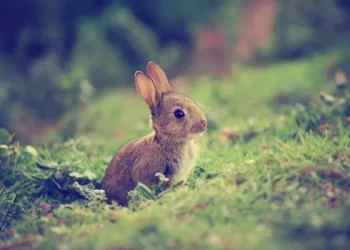Rabbits are delightful and endearing pets, known for their gentle nature and playful personalities. If you’ve recently adopted a rabbit or are caring for a newborn bunny, one of the most important considerations is their diet. Proper nutrition in the early stages of life is essential to ensure healthy growth, development, and long-term well-being. This article will provide a detailed, easy-to-understand guide on what to feed a 2-week-old rabbit.
Understanding the Development Stages of Baby Rabbits
Before diving into feeding specifics, it’s important to understand where a 2-week-old rabbit is in its development. At this stage, a baby rabbit, also known as a kit, is undergoing significant physical growth. Here are the general stages in the development of a baby rabbit:
- Birth to 1 Week: Newborn kits are blind, deaf, and dependent on their mother’s milk. They rely on this milk to grow, as it provides all the essential nutrients needed during the first week of life.
- 1 Week to 3 Weeks: Around the 1-week mark, kits begin to open their eyes and ears. During this stage, they start to show interest in solid food, but they continue to nurse from their mother.
- 3 Weeks and Beyond: At three weeks, rabbits start transitioning to a more solid diet, including hay, grass, and pellets. They may still nurse, but their digestive systems are becoming ready for more variety in their food.
At 2 weeks of age, a rabbit is still primarily dependent on its mother’s milk, but it’s important to introduce small amounts of solid food to encourage the transition to a fully solid diet.
The Role of the Mother Rabbit in Feeding
In the wild, a mother rabbit typically feeds her babies once or twice a day. The milk she produces is rich in nutrients and provides everything the kits need for the first few weeks of life. If you are raising a baby rabbit without its mother, you will need to step in as the primary caregiver, providing both nutrition and comfort.
If the mother rabbit is present and nursing the kits, your job is to ensure that the environment is safe, clean, and stress-free for both the mother and the babies. The kits should be allowed to nurse freely and may begin nibbling on solid foods at around 2 weeks old.
What to Feed a 2-Week-Old Rabbit
A 2-week-old rabbit’s diet should still be focused primarily on milk, but it’s essential to start introducing a variety of foods to get the bunny accustomed to different textures and flavors. The following foods are safe and beneficial for a 2-week-old rabbit:
1. Mother’s Milk or Milk Replacer
If the baby rabbit has access to its mother, that’s the best and most natural food source. However, if the mother is not available, you will need to feed the kit a specialized milk replacer formulated for rabbits. Never feed cow’s milk to a baby rabbit as it can cause digestive upset and potentially be fatal.
How to Feed Milk Replacer:
- Use a syringe or baby bottle with a nipple specifically designed for rabbits or small animals.
- The milk should be warmed to body temperature (around 98°F to 102°F, or 37°C to 39°C). Avoid overheating the milk, as this can harm the rabbit.
- Feed the baby rabbit every 4-6 hours, even during the night. Kits at this age need regular feedings to grow properly.
- Follow the milk replacer manufacturer’s instructions for mixing and feeding amounts.
2. Fresh Hay (Timothy Hay)
Although hay is primarily introduced later in a rabbit’s development, a 2-week-old kit may begin nibbling on small amounts of hay. Timothy hay is an excellent choice because it’s high in fiber, which is important for digestive health.
How to Offer Hay:
- Place a small bunch of fresh, soft timothy hay in the rabbit’s living area. Ensure that it’s free of mold, dust, or chemicals.
- Allow the bunny to nibble on it as desired. At 2 weeks, hay should not be the primary food but can supplement the milk intake.
Hay provides essential fiber, which is crucial for developing healthy gut flora. As the bunny continues to grow, hay will become an increasingly important part of its diet.
3. Fresh, Soft Greens
At 2 weeks, it’s okay to start offering small amounts of soft, leafy greens. This helps introduce the rabbit to the textures of vegetables and promotes healthy digestion. However, keep in mind that their digestive systems are still developing, and introducing too many greens can cause stomach upset.
Safe vegetables to offer at this stage include:
- Romaine lettuce
- Parsley
- Cilantro
- Dandelion greens (ensure they are pesticide-free)
How to Offer Greens:
- Wash the greens thoroughly to remove any pesticides or chemicals.
- Tear the leaves into small, manageable pieces and place them in the rabbit’s living area.
- Offer greens in moderation. Too much too soon can cause diarrhea or bloating.
4. Small Amounts of Rabbit Pellets
Rabbit pellets are specially formulated to provide the right balance of nutrients for rabbits, and they can be introduced around 2 weeks of age. However, pellets should not be the primary source of nutrition at this age. Instead, they should complement the milk and hay the bunny is eating.
How to Offer Pellets:
- Choose high-quality pellets that are high in fiber and low in fat and protein. Avoid pellets with added seeds, nuts, or dried fruits.
- Offer only a small amount (about one teaspoon) to begin with. Gradually increase the amount as the bunny gets older and begins eating more solid foods.
- Ensure the pellets are fresh, as stale pellets can lose their nutritional value.
5. Fresh Water
It’s essential that a baby rabbit has access to fresh water at all times. While the milk replacer or the mother’s milk will provide hydration, water should always be available for the bunny to drink as it begins to eat more solid foods.
How to Offer Water:
- Use a small, clean water bowl or a water bottle designed for rabbits.
- Change the water frequently to ensure it remains clean and free of bacteria.
6. Avoid Unsafe Foods
There are several foods that should never be given to a baby rabbit, particularly a 2-week-old kit. These include:
- Fruits: While fruits are healthy in moderation for adult rabbits, they are too sugary for babies and can cause digestive issues.
- Carrots: Although commonly thought of as a rabbit favorite, carrots are high in sugar and should be avoided until the rabbit is older.
- Cabbage and Other Cruciferous Vegetables: These can cause bloating and gas in young rabbits.
- Spinach: High in oxalates, which can interfere with calcium absorption and cause kidney problems.
7. Monitor Their Progress
It’s important to keep an eye on the bunny’s weight and overall health as it transitions from a milk-only diet to a more varied diet. Healthy weight gain is a good indicator of proper nutrition.
- Weigh the baby rabbit regularly to monitor its growth. A 2-week-old kit should be gaining weight steadily.
- Watch for signs of digestive issues like diarrhea or bloating, which may indicate that the bunny has been introduced to too much food too quickly.
8. Signs That the Baby Rabbit is Ready for Solid Foods
While a 2-week-old rabbit is still dependent on milk, you may notice it beginning to nibble on hay and greens. Here are some signs that a baby rabbit is ready to transition more fully to solid foods:
- Interest in nibbling on hay or vegetables.
- Increased mobility and exploration in its environment.
- A decrease in nursing frequency from the mother or milk replacer.
As the rabbit ages and grows, you can gradually increase the proportion of solid foods, with hay and high-fiber pellets becoming the mainstays of its diet.
General Tips for Raising a 2-Week-Old Rabbit
- Provide a Warm, Safe Environment: At this age, baby rabbits need a warm, comfortable environment to thrive. Keep their living space between 60°F and 70°F (15°C to 21°C). Provide soft bedding and avoid drafts or direct heat sources.
- Socialization: Handle the rabbit gently and consistently to help it become accustomed to human interaction. However, avoid excessive handling, as baby rabbits can become stressed easily.
- Monitor Health: Watch for signs of illness, such as lethargy, refusal to eat, or changes in stool. If you notice any of these signs, consult a veterinarian who specializes in rabbits.
Conclusion
Feeding a 2-week-old rabbit requires patience and attention to detail. At this age, the primary focus should be on providing a milk replacer or the mother’s milk, along with small amounts of hay, greens, and pellets. Gradually, as the rabbit grows, its diet will transition to include more solid foods like hay and vegetables. Monitoring the rabbit’s growth, weight, and overall health is crucial in ensuring that it develops into a healthy, happy adult rabbit.
Raising a baby rabbit is a rewarding experience, and with the right care and nutrition, your bunny will grow up to be a playful and loving companion for years to come.
Related Topics:






















